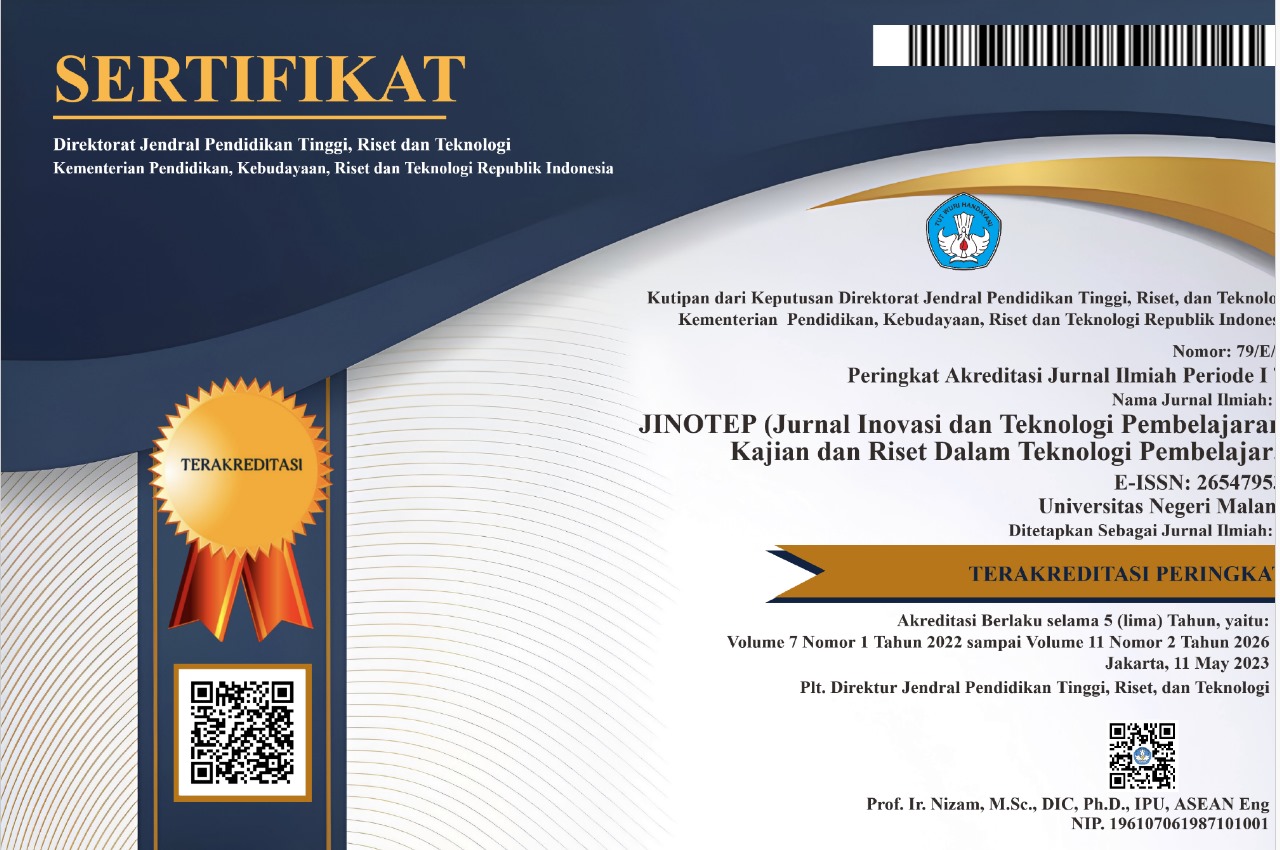AI-driven feedback system: Implementing advanced NLP and openAI for online learning
Abstract
Penelitian ini bertujuan untuk mengembangkan umpan balik otomatis berbasis Artificial Intelligence (AI) dengan teknologi Natural Language Processing (NLP) dan GPT OpenAI dalam pembelajaran online. Jenis penelitian ini adalah penelitian pengembangan atau Research and Development (R&D) dengan model pengembangan Integrative Learning Design Framework (ILDF) sebagai acuan untuk merancang, memproduksi, serta menguji efektivitas produk. Produk yang dikembangkan berperan untuk menganalisis respons siswa secara otomatis, memberikan umpan balik yang cepat, relevan, serta menawarkan saran perbaikan secara real-time yang mencakup fitur-fitur utama seperti sentiment score, entities detection, syntax & grammar, correction, improvement suggestions, hingga relevance score. Pengembangan produk ini mencakup perancangan sistem hingga pengujian awal, namun tidak melibatkan evaluasi para ahli atau uji coba skala besar. Fokus penelitian adalah memastikan bahwa produk dapat berfungsi sesuai dengan rancangan teknis dan memenuhi kebutuhan awal pengguna. Hasil dari tahap pengembangan diharapkan dapat menjadi dasar bagi penelitian lanjutan dan membuka peluang baru untuk inovasi dalam teknologi pendidikan di masa depan.
Abstract: This research aims to develop Artificial Intelligence (AI)-based automatic feedback with Natural Language Processing (NLP) technology and OpenAI GPT in online learning. The type of research is Research and Development (R&D) with the Integrative Learning Design Framework (ILDF) development model as a reference for designing, producing, and testing product effectiveness. The developed product plays a role in automatically analysing student responses, providing quick and relevant feedback, and offering real-time improvement suggestions, including key features such as sentiment score, entity detection, syntax & grammar, correction, improvement suggestions, and relevance score. The product development included system design to initial testing but did not involve expert evaluation or large-scale trials. The research focuses on ensuring that the product can function according to the technical design and fulfil the initial user needs. The results of the development phase are expected to form the basis for further research and open up new opportunities for innovation in educational technology in the future.
Keywords
Full Text:
PDFReferences
Al-Mahiroh, R. S., & Suyadi, S. (2020). Kontribusi Teori Kognitif Robert M. Gagne Dalam Pembelajaran Pendidikan Agama Islam. QALAMUNA: Jurnal Pendidikan, Sosial, dan Agama, 12(2), 117-126. https://doi.org/10.37680/qalamuna.v12i2.353
Bannan-Ritland, B. (2003). The Role of Design in Research: The Integrative Learning Design Framework. Educational Researcher, 32(1), 21-24. https://doi.org/10.3102/0013189X032001021
Bayrak, D. F., Moanes, D. M., & Altun, D. A. (2020). Development of Online Course Satisfaction Scale. Turkish Online Journal of Distance Education, 21(4), 110-122. https://doi.org/10.17718/TOJDE.803378
Castro, M. D. B., & Tumibay, G. M. (2021). A literature review: efficacy of online learning courses for higher education institutions using meta-analysis. Education and Information Technologies, 26(2), 1367-1385. https://doi.org/10.1007/s10639-019-10027-z
Cavalcanti, A. P., Barbosa, A., Carvalho, R., Freitas, F., Tsai, Y. S., Gašević, D., & Mello, R. F. (2021). Automatic feedback in online learning environments: A systematic literature review. Computers and Education: Artificial Intelligence, 2, 100027. https://doi.org/10.1016/j.caeai.2021.100027
Chen, L., Chen, P., & Lin, Z. (2020). Artificial Intelligence in Education: A Review. IEEE Access, 8, 75264-75278. https://doi.org/10.1109/ACCESS.2020.2988510
Chyung, S. Y. (2008). Foundations of Instructional and Performance Technology (Bay Suzanne & Farnham Sally (eds.)). HRD Press, Inc.
Dawson, P., Henderson, M., Mahoney, P., Phillips, M., Ryan, T., Boud, D., & Molloy, E. (2019). What makes for effective feedback: Staff and student perspectives. Assessment & Evaluation in Higher Education, 44(1), 25-36. https://doi.org/10.1080/02602938.2018.1467877
del Gobbo, E., Guarino, A., Cafarelli, B., Grilli, L., & Limone, P. (2023). Automatic evaluation of open-ended questions for online learning. A systematic mapping. Studies in Educational Evaluation, 77, 101258. https://doi.org/10.1016/j.stueduc.2023.101258
Farrell, O. (2020). A balancing act: a window into online student engagement experiences. International Journal of Educational Technology in Higher Education, 17(1). https://doi.org/10.1186/s41239-020-00199-x
Fitria, T. N. (2023). Artificial intelligence (AI) technology in OpenAI ChatGPT application: A review of ChatGPT in writing English essay. ELT Forum: Journal of English Language Teaching, 12(1), 44-58. https://doi.org/10.15294/elt.v12i1.64069
French, F., Levi, D., Maczo, C., Simonaityte, A., Triantafyllidis, S., & Varda, G. (2023). Creative use of OpenAI in education: case studies from game development. Multimodal Technologies and Interaction, 7(8), 81. https://doi.org/10.3390/mti7080081
González-Calatayud, V. (2021). Artificial intelligence for student assessment: A systematic review. Applied Sciences (Switzerland), 11(12). https://doi.org/10.3390/app11125467
Hussein, M. A., Hassan, H., & Nassef, M. (2019). Automated language essay scoring systems: A literature review. PeerJ Computer Science, 2019(8). https://doi.org/10.7717/peerj-cs.208
Lakhal, S., Khechine, H., & Mukamurera, J. (2021). Explaining persistence in online courses in higher education: a difference-in-differences analysis. International Journal of Educational Technology in Higher Education, 18(1), 1-32. https://doi.org/10.1186/s41239-021-00251-4
Makruf, I., Rifa'i, A. A., & Triana, Y. (2022). Moodle-based online learning management in higher education. International Journal of Instruction, 15(1), 135-152. https://doi.org/10.29333/iji.2022.1518a
Murniarti, E. (2019). Komunikator, pesan, pedia/saluran, komunikan, efek/hasil, dan umpan balik. Faculty of Teacher Training and Education, Universitas Kristen Indonesia Jakarta.
Nandini, V., & Uma Maheswari, P. (2020). Automatic assessment of descriptive answers in online examination system using semantic relational features. Journal of Supercomputing, 76(6), 4430-4448. https://doi.org/10.1007/s11227-018-2
Nicol, D. J., & Macfarlane-Dick, D. (2006). Formative assessment and self-regulated learning: A model and seven principles of good feedback practice. Studies in Higher Education, 31(2), 199-218. https://doi.org/10.1080/03075070600572090
Ouyang, F. (2023). Integration of artificial intelligence performance prediction and learning analytics to improve student learning in online engineering courses. International Journal of Educational Technology in Higher Education, 20(1), 4. https://doi.org/10.1186/s41239-022-00372-4
Pham, M., Singh, K., & Jahnke, I. (2023). Socio-technical-pedagogical usability of online courses for older adult learners. Interactive Learning Environments, 31(5), 2855-2871. https://doi.org/10.1080/10494820.2021.1912784
Prabawa, I. P. A. E., Kanca, I. N., & Wijaya, I. M. A. (2019). Pengaruh metode pembelajaran reciprocal berbantuan feedback visual terhadap hasil belajar lompat jauh pada peserta didik kelas VIII SMP Negeri 1 Mengwi tahun pelajaran 2018/2019. Jurnal Pendidikan Jasmani, Olahraga dan Kesehatan Undiksha, 7(2), 45-52.
Rodriguez, C. A., Valderrama, S., Vargas, D., Eliseo, M. A., Fracchia, C. C., & Roa, K. (2023). Quizzes via Augmented Reality on Learning Management System: A Case Study of Moodle. Journal of Educators Online, 20(1), n1.
Shelton, B. E., & Scoresby, J. (2011). Aligning game activity with educational goals: Following a constrained design approach to instructional computer games. Educational Technology Research and Development, 59(1), 113-138. https://doi.org/10.1007/s11423-010-9175-0
Slamet, S. S. (2020). Hubungan strategi umpan balik (feedback), motivasi berprestasi dan hasil belajar dalam pembelajaran PPKn di SMK. PINUS: Jurnal Penelitian Inovasi Pembelajaran, 5(2), 39-56. https://doi.org/10.29407/pn.v5i2.14539
Sofyatiningrum, E., Ulumudin, I., & Perwitasari, F. (2019). Kajian umpan balik guru terhadap hasil belajar siswa. Indonesian Journal of Educational Assesment, 2(2), 56-65.
Sugiyono. (2022). Research & Development Methods: for Education, Management, Social and Engineering. Bandung: Alfabeta Publisher, 28.
Süzen, N., Gorban, A. N., Levesley, J., & Mirkes, E. M. (2020). Automatic short answer grading and feedback using text mining methods. Procedia Computer Science, 169, 726-743. https://doi.org/10.1016/j.procs.2020.02.171
Ugur, B., Arkun Kocadere, S., Nuhoglu Kibar, P., & Bayrak, F. (2021). An open online course to enhance digital competences of teachers. Turkish Online Journal of Distance Education, 22(4), 24-42.
Urrutia, F., & Araya, R. (2023). Automatically Detecting Incoherent Written Math Answers of Fourth-Graders. Systems, 11(7). https://doi.org/10.3390/systems11070353
Vai, M., & Sosulski, K. (2011). Essentials of online course design: A standards-based guide. Routledge.
van der Kleij, F. M. (2019). Comparison of teacher and student perceptions of formative assessment feedback practices and associations with individual student characteristics. Teaching and Teacher Education, 85, 175-189. https://doi.org/10.1016/j.tate.2019.06.010
Vo, N. N. Y., Vu, Q. T., Vu, N. H., Vu, T. A., Mach, B. D., & Xu, G. (2022). Domain-specific NLP system to support learning path and curriculum design at tech universities. Computers and Education: Artificial Intelligence, 3. https://doi.org/10.1016/j.caeai.2021.100042
Wong, J., Baars, M., Davis, D., Van Der Zee, T., Houben, G. J., & Paas, F. (2019). Supporting Self-Regulated Learning in Online Learning Environments and MOOCs: A Systematic Review. International Journal of Human-Computer Interaction, 35(4-5), 356-373. https://doi.org/10.1080/10447318.2018.1543084
Yu, J., & Jee, Y. (2021). Analysis of online classes in physical education during the covid-19 pandemic. Education Sciences, 11(1), 1-14. https://doi.org/10.3390/EDUCSCI11010003
Zawacki-Richter, O., Marín, V. I., Bond, M., & Gouverneur, F. (2019). Systematic review of research on artificial intelligence applications in higher education–where are the educators?. International Journal of Educational Technology in Higher Education, 16(1), 1-27. https://doi.org/10.1186/s41239-019-0171-0
Zhai, X., Chu, X., Chai, C. S., Jong, M. S. Y., Istenic, A., Spector, M., Liu, J. B., Yuan, J., & Li, Y. (2021). A Review of Artificial Intelligence (AI) in Education from 2010 to 2020. Complexity, 2021. https://doi.org/10.1155/2021/8812542
Zimmerman, W., Altman, B., Simunich, B., Shattuck, K., & Burch, B. (2020). Evaluating online course quality: A study on implementation of course quality standards. Online Learning Journal, 24(4), 147-163. https://doi.org/10.24059/olj.v24i4.2325
DOI: http://dx.doi.org/10.17977/um031v11i32024p137
Refbacks
- There are currently no refbacks.
Copyright (c) 2024 Liberius Sabinus Koe, Cecep Kustandi, Eveline Siregar

This work is licensed under a Creative Commons Attribution-ShareAlike 4.0 International License.
======================================================================
Jurnal Inovasi dan Teknologi Pembelajaran published by Universitas Negeri Malang in collaboration with the Asosiasi Program Studi Teknologi Pendidikan Indonesia (APS TPI) and Ikatan Profesi Teknologi Pendidikan Indonesia (IPTPI) with a MoU.
Publisher Address:
Educational Technology Laboratorium, Building D5, 1st Floor
Faculty of Education, Universitas Negeri Malang
Semarang St. No. 5, Malang City, East Java Province, Postal Code 65145
Email: jinotep.fip@um.ac.id
======================================================================

JINOTEP is licensed under a Creative Commons Attribution-ShareAlike 4.0 International License.
JINOTEP Statistics (Since July 13th, 2020)



.png)




.png)
1.png)
1.png)
4.png)
2.png)
1.png)
1.png)
.png)


_3.png)





1.png)
.png)